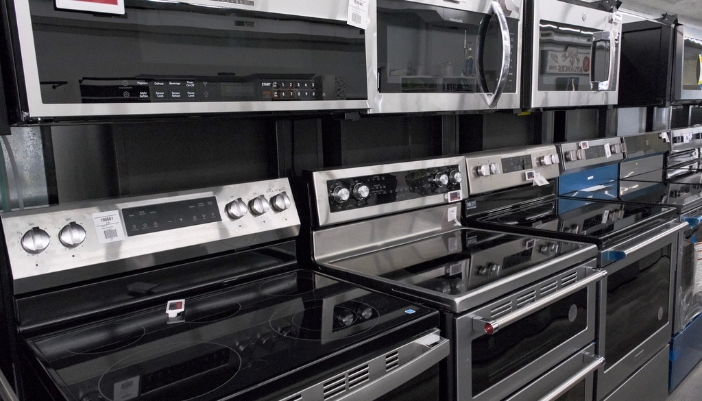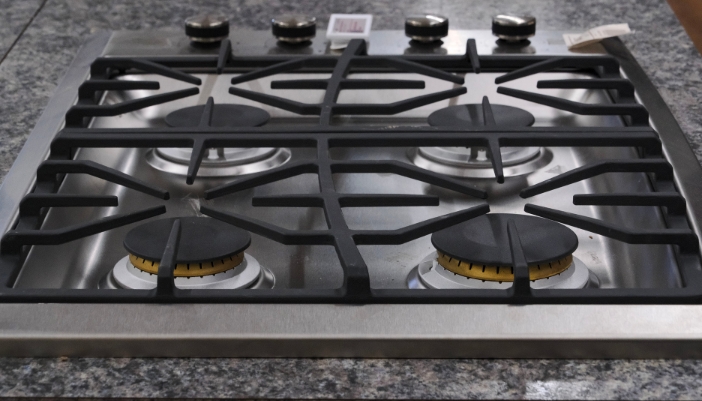When it comes to replacing a range, the decision often comes down to one major question: gas or electric? Both options have advantages over the other, and the right choice for your kitchen often depends on you. What is your personal preference? What is your cooking style? Gas ranges are typically loved for their instant heat, while electric ranges offer a steady and consistent oven performance.
If you’re looking to remodel, upgrade, or are simply curious about the differences between gas and electric ranges, understanding the distinctions between them can help you to make an informed decision about what is right for your kitchen. In this article, we’ll teach you about both types of ranges and the benefits they can bring to your table.
What is a Gas Range?
A gas range is very similar to your typical electric stove; there’s just one major difference– the fuel that powers it. Gas ranges use either natural gas or propane to produce an open flame under the burners on the cooktop, as well as in the oven. In modern gas ranges, turning the cooktop knob allows gas to flow to burner ports and ignite via an electric spark. Inside the oven, a gas flame cycles on and off to maintain the set temperature. However, there is one caveat to owning a gas range: your kitchen must be set up with a gas line or propane hookup. Some homes already have this, but if yours does not, there could be additional costs associated with the installation and setup.

Advantages of a Gas Range
There are some incredible benefits to owning a gas range – from cooking functionality to cleaning. Below are some of the best features, according to your local Shore Appliance Sales Team:
- Visible, instantaneous heat control: With a gas flame, the transition between the heat levels is immediate as soon as you turn the dial, giving you much more precise control. It’s easier to simmer and sear, and you can physically see and feel the difference from the flame.
- Cooking Technique: Having a gas range allows for different cooking techniques that can’t always be achieved on an electric range. Getting that perfect sear is so much easier on a gas range, and woks work especially well because the heat can be evenly distributed up the sides.
- Quick Cooldown: The gas burners cool off much quicker than radiant or glass-ceramic electric cooktops because the heat comes from a direct flame as opposed to heated burners.
- Easier Cleaning: Gas ranges disassemble with ease. You can remove the burners and knobs, and then soak them in a mixture of Dawn dish soap to loosen any burnt-on food.
- Savings: While it is hard to calculate the exact amount of savings, it’s reported that gas or propane is cheaper per unit than electric, and with electricity priced the way it is right now, any bit of savings is good!
- Compatible with most cookware: Gas stovetops work well with any sort of pan, and there’s no need to worry about a glass surface when using a cast-iron skillet.
What is an Electric Range?
Electric ranges use electricity to power heating elements that convert the electricity to heat. These elements are either embedded into the oven or placed beneath a ceramic-glass top. There are a few different styles of electric ranges, as technology has vastly improved over the years:
- Exposed coil/radiant elements: the “old style” coil burners that sit elevated from the surface of the stove
- Smooth glass-ceramic: heating elements under a smooth, flat surface.
- Induction: copper coils underneath the cooking surface to generate electromagnetic energy; this energy transfers directly to induction-compatible cookware, which then heats up.
In the oven cavity, electric ranges use heating elements (on the top and bottom) which turn on and off to maintain your set temperature; electric ovens deliver a drier heat than gas, which can help get a more consistent bake. Unlike gas ovens, there is no need to have a special line run – it’s just a 240V outlet, making replacement a breeze!

Advantages of an Electric Range
Electric ranges also have their fair share of amazing features that differ from their gas counterparts. From the way the oven works to overall functional safety, there are multiple reasons why an electric range may better fit your needs. Below are some of the main benefits:
- Baking: Electric ranges are popular with bakers because they can maintain a more consistent temperature with dryer air. Electric heating elements tend to cycle more precisely than gas, allowing for a more even bake, roast, or brown.
- Heat Transfer: Electric ranges offer a more even heat transfer because the pans directly make contact with the elements. Some electric ranges even offer dual burners for different pot and pan sizes, allowing even more flexibility.
- Safer: There is no open flame with an electric range, which eliminates the risk of gas flare-ups.
- Renewable Energy: Electric cooking is more compatible with sustainable energy goals as it eliminates dependence on fossil fuels in the kitchen.
So, which is right for you – electric or gas? There’s really no right answer. It’s all about personal preference. If you prefer responsive, high-heat cooking, a gas range may be the right fit; if you do a lot of baking, roasting, or browning, an electric range may better suit your needs. Don’t hesitate to reach out to your local Shore Appliance retailer, where the dedicated sales team is there to help make your range decision a piece of cake.
